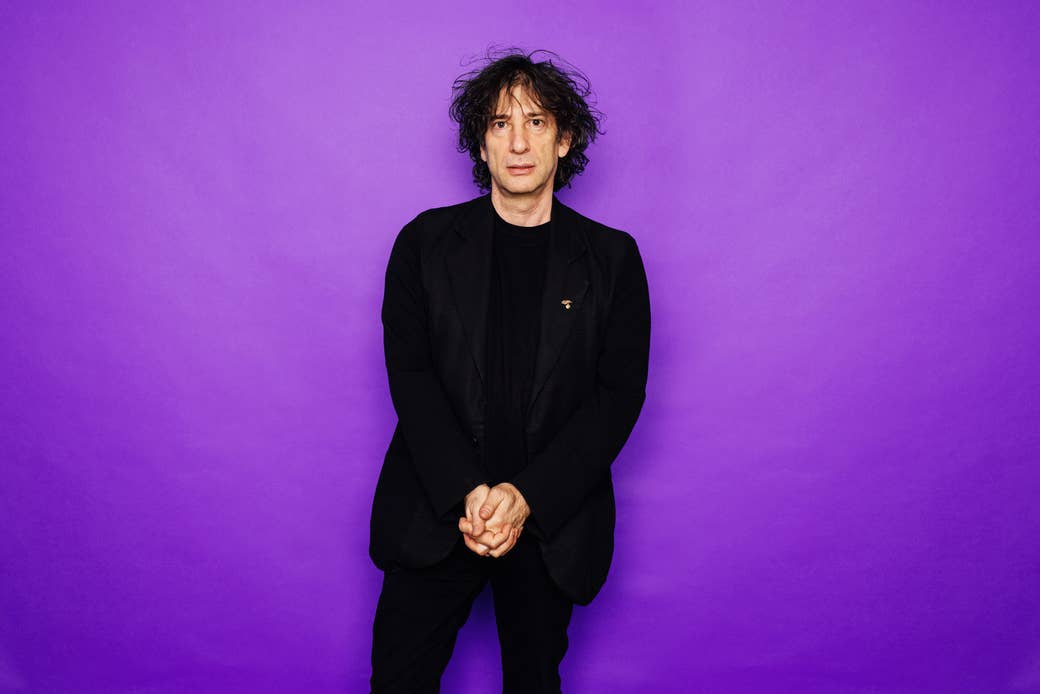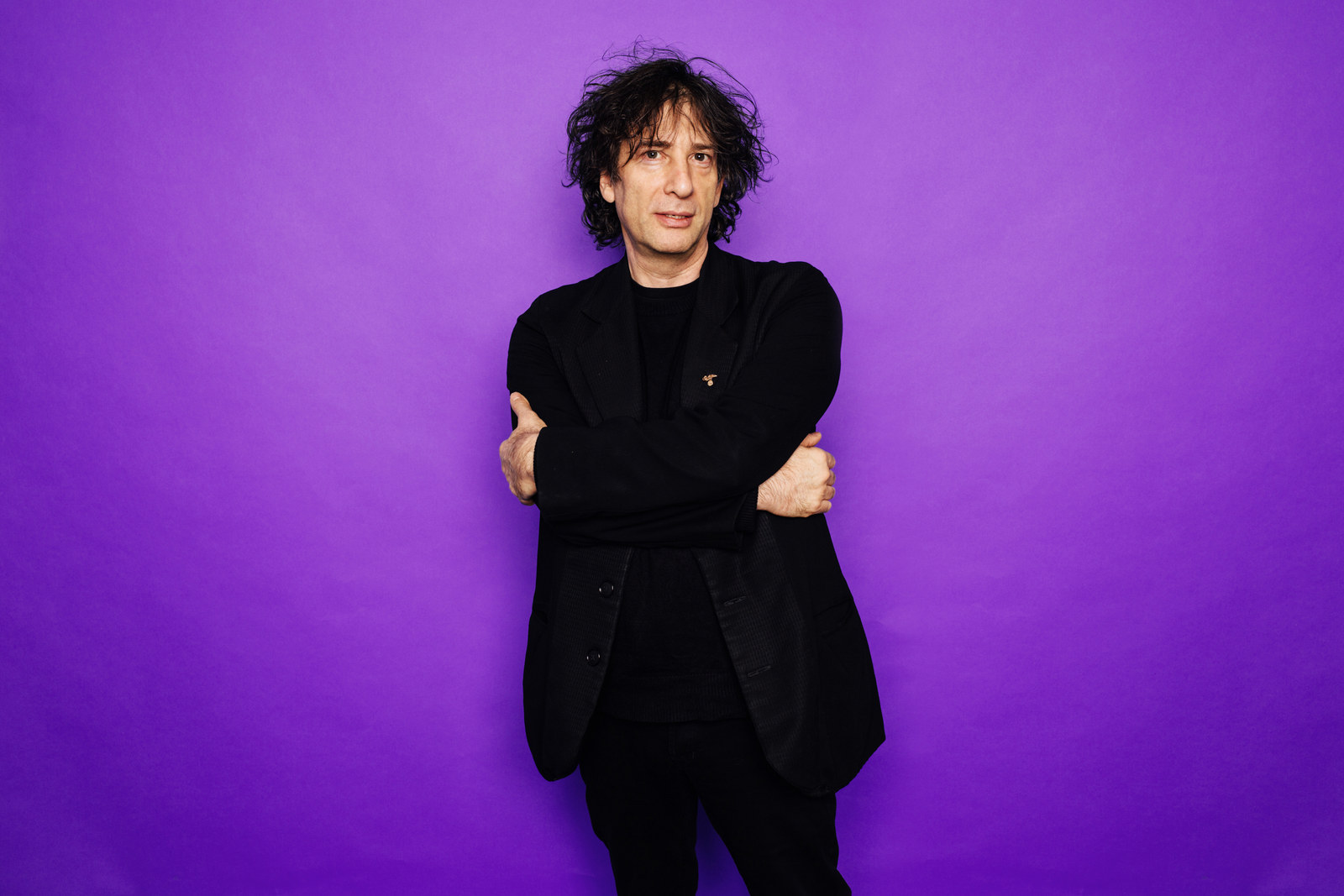
Neil Gaiman is known as many things — author, poet, screenwriter, spouse of Amanda Palmer, owner of very good dogs — but for many, he is celebrated first and foremost as the mind behind the prolific comic series The Sandman.
Published in monthly installments with DC Comics starting in 1989, the series went on for 75 issues and one special, and catapulted Gaiman into the kind of fame rarely experienced by writers. Now, 29 years later, Gaiman has returned to the world of The Sandman in a prequel titled The Sandman: Overture. Initially released in six installments over the course of two years, the complete Overture has been collected into a deluxe edition.
BuzzFeed had the chance to catch up with Gaiman to discuss storytelling, The Sandman's enduring legacy, and the importance of visiting other peoples' heads.
You wrote Sandman when you were, what? 28, 29?
Neil Gaiman: I started when I was 26. When the first Sandman came out, I would have just turned 28. It was very weird. I was being interviewed this morning on NPR, and he was asking me about some themes and choices that I’d made all those years ago, and I had to tell him I don’t know. I don’t remember. The thing that’s weirdest for me is how much Sandman: Overture feels like part of the same thing. It goes into Sandman 1 [Preludes and Nocturnes] and you can keep reading it. It doesn’t necessarily feel as though it was written by two different people.
Do you feel like two different people?
NG: Yeah, I do. But the interior me is still the same. And the 26-year-old me coming up with Sandman just feels like he’s somebody out in the corridor. I could take a step out there and step into his head. But definitely — here we are, 29 years later, and I’m definitely somebody else. Twenty-nine years worth of stuff has happened.
I’m 25 and everyone I know is a little bit of a mess. I am also a little bit of a mess. Were you a little bit of a mess at 26, when you started this?
NG: I was a glorious mess at 26. But I was a glorious mess who had a sort of combination of dreams of grandeur and no plan B.
"I was a glorious mess at 26. But I was a glorious mess who had a sort of combination of dreams of grandeur and no plan B."
What I wanted to do was write. I looked around and blinked and here I was, 26, with two very small children, just about earning a living as a freelance journalist. I had just gotten to the point where I was doing almost OK, but I didn’t want to be a journalist. I wanted to make stuff up. I especially wanted to make up comics. I’d look at novels, and the books on shelves, and I’d go, “There’s been 3,000 years worth of these and there are some really good ones.” And then I’d look at comics and there were areas that were just jungle. I thought, I can take my machete, and I can go out into places that nobody’s gone before, because this thing’s only been going for 100 years and there’s stuff nobody’s done, so I could do it.
Looking at Sandman now, there is so much chutzpah. It’s a weird combination of chutzpah and desperation, as I’m going "OK, what can I do?" At the time, my head was not in the right place to write superhero comics that will work. I knew this. And I’d known it even as a little kid reading superhero comics. It just seemed to me that the fundamental equation of a superhero comic was if you can hit the other guy hard enough so that he stays down, you won. And I’d read them and think, I do not believe this. I don’t believe that hitting somebody is actually a solution to anything. The people who come over and hit me at school, generally speaking, it didn't make them right. It just made me hurt. And made them dicks.
So that theory of superheroes translated. A fight scene didn’t seem to be anything that I would ever want to write. The question then was, what do I want to write? What stories do I want to tell? I want to do myth, and history, and fantasy, and dark fantasy, and high fantasy. I want to do everything. And I can do it all over here in this weird monthly comic. It's not autobiographical except as a kind of portrait of the inside of my head. As that, it’s incredibly accurate.

Did you expect it to become as big as it did?
NG: No. What I expected was not necessarily what I hoped for. Back then they would let comics go for a year. So I expected that at issue 8, they would say, "OK, looking at the last five months of sales, it’s time to cancel it, time to wrap it up, we’ll let you go until issue 12 and then we’re canceled." That’s why I plotted an eight-issue story arc. And then I thought that I would do four one-off stories, and then we’ll close, and then a year later I’ll come back and do a Sandman special or whatever.
It’s worth bearing in mind that the biggest difference between comics pre-Sandman and post-Sandman was that critical success was commercial failure. Critical success tended to mean that it was a book that didn’t sell. I assumed that Sandman would be a minor critical success and an utter commercial failure. And I was good with that! But that didn’t mean that I wasn’t going to dream this giant impossible dream, not only a dream that the story would continue, but the dream of building a story that began, middled, and finished, and that when it finished DC Comics would stop the comic. And that was impossible. Nothing like that had ever happened before — the idea that an ongoing series that was commercially successful would end or would have an ending, that was unheard of. And so I was planning all this stuff that I knew wouldn’t happen, but I had to plot as if it would. I had to build the stuff in to the first eight issues that would pay off, some of it, six years later. I was doing this in the knowledge that I would probably get a year, but I had to try. If I didn’t try, there was no point.
Mythology factors strongly into almost all of your writing, and especially Sandman. If every age constructs its own mythology, do you think that ours will be different because it will be more accessible, in that we’re telling these stories so openly?
NG: I think that everything is changing due to social media. But I’m also watching social media change. I'm fascinated right now watching Twitter start to die. I’m feeling like we’re in the last days of Twitter; it doesn’t feel as though it’s alive and growing and being the thing that it was. And on the one hand, I’m already kind of missing it even though I’m still there, and on the other hand it’s gone on for three times as long as I thought it would. I assumed that things would come along to supplant it, and they haven’t. I assumed that things would come along to supplant Facebook, and they haven’t. I wonder if we’re starting to get into shark world. In Internet terms, Facebook is a dinosaur. But nothing’s as good as being Facebook as Facebook is, so it keeps swimming.
Do you think there's any permanency to it? There's the possibility that what we write on Twitter and Facebook and Tumblr might be historical documents at some point. Is that kind of access better for storytelling?
NG: I no longer believe in the permanence of anything on the net. I’ve been bitten too many times. These days I’m shocked at how many times I will go looking for something that was big and important on the Web, and I’ll look and simply find evidence that it once existed and that I haven’t hallucinated it.
That makes me think of oral storytelling. Is the internet a new version of oral storytelling, do you think?
I think it is. What the internet gives us that’s fascinating is the long tail, and what I like to think of as the big village, the village of your own kind. I think that’s the strength of something like Tumblr and the weakness of it.
You wind up in a village of people who think the same thing as you, who say the same thing, who like the same thing. On the one hand that’s wonderful, because when I was a kid, finding the people who liked what I liked and thought what I thought and read what I read and could have recommended to me things that I would have loved was a magic pipe dream. If there was one of us in each town, it didn’t matter that there were hundreds of thousands of towns in the world, we’re still never going to find each other. And the fact that now, you can find each other, is wonderful.
"I want a diversity of viewpoint in every way, and diverse things include just the inside of other heads. It’s wonderful. Other cultures, other places. We have to go there. We have to experience these things."
On the other hand, it also means that those people are only talking to each other and only hearing each other. I watch that happen, and I think it’s not good. For me, what’s always important with writers, is the joy of getting other points of view and seeing things through other eyes. To have not just the right, but the power, to look at something and say, "This thing that you are doing and saying is wonderful," or "This thing that you’re doing and saying is wrong," or "This thing that you are doing and saying is a thing of its time and you would probably not think or say it now." The best thing about this experience is the feeling of "You’re not me, and I am seeing things and my worldview is changing." What a sad world we would live in, if the only people whose fiction I could read, whose poetry I could experience, whose songs I could sing, were people who thought and imagined in exactly the same way that I do. I want a diversity of viewpoint in every way, and diverse things include just the inside of other heads. It’s wonderful. Other cultures, other places. We have to go there. We have to experience these things.
The Sandman: Overture Deluxe Edition is on sale now.

